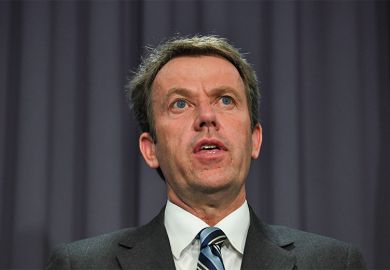Australian education minister Dan Tehan has challenged the country’s international education sector to diversify by shepherding more foreign students away from major cities.
But Mr Tehan was set to stop short of repeating prime minister Scott Morrison’s controversial suggestion that international student numbers in major cities could be capped in a bid to increase enrolments elsewhere.
In a prepared keynote address to a major Sydney conference, Mr Tehan was expected to say that he wants regional Australia to be “a greater part of the international education story”.
Foreign students should have the opportunity “to experience a different Australia – to live and study in our regions, to see the bush and build friendships”, Mr Tehan was set to say.
“The government believes there is enormous potential in the international student market in regional Australia,” he was due to say. “How wonderful [it would be] for kids in [the rural centres of] Bathurst, Bendigo or Bundaberg to live and study with students from China, Brazil or the United Kingdom.
“We want more students to have experiences of engaging with our regions and I encourage you all to think about how we can achieve this. This is part of diversification.”
The regional study imperative was expected to be a major topic of conversation at the Australian International Education Conference, where Mr Tehan was scheduled to deliver his speech on 10 October.
The previous day, population minister Alan Tudge – who styled himself as the “minister for congestion busting” – outlined the government’s goal of “directing new migrants to smaller states and regions” to ease crippling traffic in fast-growing Melbourne, Sydney and south-eastern Queensland.
Mr Tudge said that international students were a key component of the temporary migration that had helped propel urban growth beyond predictions.
“Settling even a slightly larger number of new migrants to the smaller states and regions can take significant pressure off our big cities,” he said, in a prepared speech to the Menzies Research Centre in Melbourne.
The idea – and whether international students will be part of it – was likely to attract much discussion at the Sydney conference. Last month Phil Honeywood, chief executive of the International Education Association of Australia, warned that such a policy could become a “serious disincentive” for “globally mobile students whose expectations centre much more around university rankings and employment opportunities” than “getting to know the real Australia”.
“While some of our regional-based universities have an outstanding reputation for certain niche courses, evidence suggests that a Chinese student hoping to enrol in the most popular courses of business or IT will follow the global rankings,” Mr Honeywood wrote in The Australian newspaper.
“If told by an Australian government that to gain a student visa they must enrol in a relatively lower academically ranked university in our regional centres, many instead will enrol in a higher-ranked institution in a competitor country.”
Mr Tehan’s speech was set to praise the international education sector for having crafted an industry worth more than A$32 billion (£17 billion). But he was expected to warn that the sector must cultivate more diversity in locations, partner countries and course offerings to stave off international competition and exploit its “inherent advantages as an international study destination”.
The speech was expected to highlight Australia’s position as a “world leader” with preview figures from the government’s biennial International Student Survey, to be released later this year.
It says that foreign students reported high levels of satisfaction with their learning experience, support and living experience. Satisfaction rates ranged from 87 per cent among international vocational education students to 91 per cent at private higher education colleges.
Register to continue
Why register?
- Registration is free and only takes a moment
- Once registered, you can read 3 articles a month
- Sign up for our newsletter
Subscribe
Or subscribe for unlimited access to:
- Unlimited access to news, views, insights & reviews
- Digital editions
- Digital access to THE’s university and college rankings analysis
Already registered or a current subscriber?








